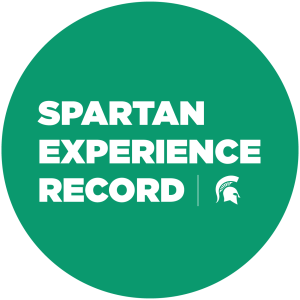
Learning Outcomes
The Spartan Experience Record uses 28 learning outcome statements that are designed to help students identify, communicate, and synthesize their transferable skill development in co-curricular experiences at MSU. Each opportunity in the SER requires one to a maximum of five learning outcomes per experience.
The learning outcomes are reflective of transferable skills and learning articulated through the following sources:
- MSU Undergraduate Learning Goals
- MSU Global Learning Outcomes
- Spartan Undergraduate Experience Project
- High Impact Practices
- NACE Career Competencies
2024-2025 Updates
Within spring/summer 2024, the SER Learning Outcomes and Categories underwent formal committee review. The updated learning outcomes are defined by synthesis of institutional goals and priorities, as well as the NACE Career Competencies, which outline the skills employers are seeking in recent graduates. Collectively, our learning outcomes are reflective of critical transferable, or durable skills, Spartans will develop in out-of-classroom experiences.
The SER learning outcomes updates are now live for the 2024-2025 academic year. What’s new?
- Revised outcomes – improved for clarity and alignment to undergraduate student learning
- Added outcomes – reflecting the growth and focus of learning priorities at MSU.
- Added sub-categories – helping make learning outcomes more relevant and impactful for student utilization.
Spartan Experience Record Learning Outcomes
Application of Knowledge
1. Apply knowledge and skills to develop purpose
2. Apply knowledge and skills in professional settings
3. Apply knowledge to solve real world problems
4. Build creative/innovative design processes
5. Demonstrate financial responsibility
6. Use context appropriate leadership strategies
Communication
7. Articulate personal skillsets or values
8. Demonstrate effective interpersonal communication
9. Utilize multiple media to communicate
Community and Collaboration
10. Build or support inclusive communities
11. Collaborate or build relationships
12. Contribute to a team or community
Critical Thinking
13. Analyze and evaluate data
14. Practice critical thinking and inquiry
Decision Making
15. Balance priorities and manage time
16. Develop an action plan to achieve set goals
17. Make informed, ethical decisions
18. Use inclusive and equitable practices to inform actions
Diversity, Equity, and Inclusion
19. Advocate for myself and others
20. Learn/understand cultures and perspectives different from my own
21. Promote social and civic responsibility
22. Understand connections between culture, society, politics, and arts
23. Work effectively in a diverse environment
Learning Facilitation
24. Facilitate learning through peer-to-peer interactions
25. Facilitate and support course learning
26. Lead a presentation, meeting, or workshop
Well-Being
27. Contribute to health and well-being of self and others
28. Enact policy/procedures to foster a safe environment
